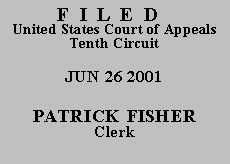

| UNITED STATES OF AMERICA,
Plaintiff-Appellee, |
|
| v. | |
| DARRELL LAMONT BAILEY,
Defendant-Appellant. |
|
Darrell Lamont Bailey, a federal prisoner appearing pro se, seeks a certificate of appealability to appeal the denial of his 28 U.S.C. § 2255 habeas petition. We deny a certificate of appealability and dismiss the appeal.
Bailey was convicted of two counts of assaulting a federal prison employee, in violation of 18 U.S.C. § 111(a). This court affirmed his conviction on direct appeal, but remanded for resentencing. See United States v. Bailey, 76 F.3d 320 (10th Cir. 1996). Bailey filed his habeas petition on November 15, 1996, alleging: (1) bias and prejudice of the district judge assigned to the case; (2) "limited self-representation defeats effective representation;" (3) "selective prosecution as affirmative defense denied pro se movant"; (4) Comprehensive Crime Control Act was unlawfully passed; (5) zip codes used for selection of potential jurors is unconstitutional; and (6) ineffective assistance of counsel. The petition was denied on February 2, 2001. The court found there was no reason for the judge's disqualification, and there was "no improper interference with [Bailey's] right to self-representation. The court found that the remaining four grounds for relief were either raised on direct appeal or could have been raised on direct appeal and were without merit. Bailey has waived some of his issues by not raising them on appeal.
Bailey argues that he received ineffective assistance of counsel because counsel was forced upon him against his will. At the trial stage, a defendant has a right to defend himself, but the trial court can appoint an attorney to advise the defendant and be available if the need arises. See Faretta v. California, 422 U.S. 806, 834 n.46 (1975). That is what occurred here. The district court appointed an assistant federal public defender as advisory counsel. On the eve of trial, Bailey requested that the advisory counsel be appointed to represent him. Contrary to Bailey's argument, there is no right to self-representation on direct appeal. See Martinez v. Court of Appeal of California, 528 U.S. 152, 155 (2000). The district court conducted a hearing to address Bailey's claim that he was forced to accept appointed counsel because he was improperly denied library access. The court found he had adequate access to legal materials and that any delay in access was justified by security concerns.
Bailey argues that the district court erred in denying his motion to join with other defendants in an objection to the jury wheel. Bailey fully litigated his claims regarding the jury wheel at trial and on direct appeal. He does not allege how he was harmed by the denial of his motion.
Bailey asks us to remand to the district court for consideration of whether the rule set out in Apprendi v. New Jersey, 530 U.S. 466 (2000), applies to his case, but he makes no arguments as to why it would apply. Apprendi is only relevant where a defendant has been sentenced beyond the statutory maximum term. See United States v. Keeling, 235 F.3d 533, 538 (10th Cir. 2000). Bailey has not alleged he was sentenced beyond the applicable statutory term for violation of 18 U.S.C. § 111(a). Since the Apprendi argument is insufficiently developed, we will not consider it. See Murrell v. Shalala, 43 F.3d 1388, 1389 n.2 (10th Cir. 1994).
The application for a certificate of appealability is DENIED and the appeal is DISMISSED. The mandate shall issue forthwith.
Entered for the Court
Mary Beck Briscoe
Circuit Judge
*.This order and judgment is not binding precedent, except under the doctrines of law of the case, res judicata, and collateral estoppel. The court generally disfavors the citation of orders and judgments; nevertheless, an order and judgment may be cited under the terms and conditions of 10th Cir. R. 36.3.